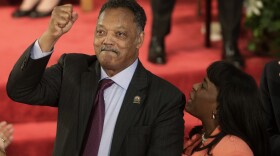
A Senate panel is giving the thumbs up to a measure establishing state-wide regulations for ride hailing services like Uber and Lyft.
Lawmakers have been trying for four years to set up a single system for ride hailing apps. Companies, like Uber and Lyft, pride themselves on their ability to disrupt antiquated industries by providing more tailored services at lower costs. But a handful of municipalities approving ordinances regulating the companies was all it took to undermine their business model. Sen. Jeff Brandes (R-St. Petersburg) is backing a bill to supersede those local measures.
“This bill eliminates the patchwork of local regulations on ride sharing, establishing a statewide standard for TNCs,” Brandes explains.
TNC means transportation network company—the statutory term for companies like Uber.
Brandes argues drivers cross municipal borders all the time, and they need to know they’re operating within the law.
“Just take my example of Pinellas County,” he says. “We have Pinellas, Pasco, [and] Hillsborough all within a stone’s throw of one another in certain points, and you could have three different type of regulations in every one of those counties.”
“So if you operated in Pinellas predominately but then there was some sporting event in Hillsborough you’d have to go fall under their rules,” he goes on, “and if there was some event in Pasco you’d have to fall under their rules. So it would be very difficult to operate a business under that type of environment where you don’t know where your next pick up and drop off is going to be.”
But as the new entrants square off against legacy companies, cities and counties are trying to fend off what they see as state overreach.
“The Florida League of Cities fundamentally opposes preemption of local government,” Florida League of Cities lobbyist Megan Sirjane-Samples says, “and under this legislation cities and counties would have zero authority to regulate or address concerns with transportation network companies.”
The League lobbies on behalf of various localities across the state. Its arguments for local control, stiffer background checks, and insurance requirements are much the same as they were in previous years.
But a more persuasive voice has Sen. Perry Thurston’s (D-Fort Lauderdale) ear.
“I support this bill and I think that there is a need for a uniform standard around the state,” Thurston says. “But I also want to say that I support it because my wife who travels extensively has kind of put her thumb on the scale, in terms of what she thinks about this legislation and she normally doesn’t even do that.”
Even as the broad strokes of this year’s debate echo arguments from previous years, new issues are coming to the fore.
“What we’re asking for is one half of one percent of TNC revenue go to the state, and then it be redistributed to the counties for the provision of disability transportation,” Sen. Gary Farmer (D-Fort Lauderdale) suggests.
He explains Broward County struggles to provide transportation for its disabled community—particularly in terms of paratransit.
Brandes’ measure passed the Senate committee, but Farmer’s amendment did not.
Uber spokesman Javier Correoso says the approval is something of a milestone.
“Yeah we’re very optimistic,” Correoso says, “obviously this is a big step forward this is the first time that a Senate committee passes a ride sharing bill. We have two more stops. We still have to go to the judiciary and the rules committee, but we’re very optimistic.”
It’s a small win, but after the past few weeks, Uber will probably take what it can get. A wave of customers deleted the app during President Trump’s travel ban, a female software engineer recounted a years’ worth of ongoing, systemic sexual harassment at Uber, and CEO Travis Kalanick was caught on video screaming at one of his company’s drivers.
Meanwhile competitor Lyft has timed its arrival in Tallahassee to correspond with the opening of the legislative session.
Both businesses—and whatever future companies come along to disrupt them—stand to benefit from a state-wide TNC policy. After four years of effort it seems as though Florida lawmakers may be ready.
Copyright 2020 WFSU. To see more, visit WFSU. 9(MDAyMTYyMTU5MDEyOTc4NzE4ODNmYWEwYQ004))





